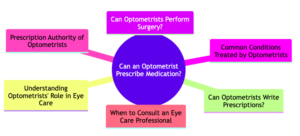Can an Optometrist Prescribe Medication?
Understanding Optometrists’ Role in Eye Care
Can an Optometrist Prescribe Medication? Yes, they can. Optometrists are pivotal in primary eye care, extending beyond vision correction to diagnosing and managing eye health. They are trained to identify, treat, and manage various eye diseases and conditions. Their role includes prescribing medications for specific eye-related issues, making them an integral part of eye health management.
Key Takeaways
- Optometrists provide comprehensive eye care, not limited to vision tests.
- They diagnose and manage a wide range of eye conditions.
- Optometrists can prescribe medications for various eye diseases.
- Their training includes extensive education in eye health.
- Regular visits to an Optometrist are essential for maintaining eye health.

What Is the Difference Between Optometry and Ophthalmology?
Optometry and ophthalmology, while both crucial to eye care, differ significantly. Optometrists are eye care professionals who provide primary vision care, ranging from sight testing and correction to diagnosing, treating, and managing vision changes. Ophthalmologists are medical doctors specializing in eye and vision care, capable of performing eye surgery and treating all types of eye diseases. The key differences lie in their training, scope of practice, and surgical capabilities.
Optometry vs. Ophthalmology: Comparison Table
| Aspect | Optometrists | Ophthalmologists |
| Training | Doctor of Optometry (OD) degree, typically 4 years post-undergraduate, focusing on eye health, vision care, and basic medical training. | Medical degree (MD or DO), followed by a residency in ophthalmology (3-4 years), focusing on comprehensive eye care, including medical and surgical treatment. |
| Scope of Practice | Primary eye care – including vision tests, prescribing glasses and contact lenses, diagnosing and treating various eye conditions, and managing chronic eye diseases. | Comprehensive eye care encompassing all aspects of eye health, including diagnosis, management, and treatment of all eye conditions, both medically and surgically. |
| Prescribing Medications | Can prescribe a wide range of topical and some oral medications for eye conditions, such as antibiotics, antivirals, and anti-allergies. | Authorized to prescribe a full spectrum of medications, including topical and systemic drugs for eye conditions and related complications. |
| Surgical Capabilities | Limited to minor surgical procedures, such as certain types of laser eye surgery (e.g., for glaucoma), and non-invasive procedures like foreign body removal. | Capable of performing a wide range of eye surgeries, from common procedures like cataract extraction to complex surgeries involving the retina, cornea, and other eye structures. |
Can an Optometrist Prescribe Medication?
Optometrists are authorized to prescribe a variety of medications related to eye care. Their prescribing power typically includes topical medications for conditions like bacterial and viral conjunctivitis, glaucoma, and inflammation, as well as oral medications in some jurisdictions. However, their authority to prescribe is generally limited to eye-related conditions and varies by region, with some restrictions in place.
Optometrists play a crucial role in providing first-line treatment for many common eye conditions. They can prescribe anti-allergy eye drops, antibiotics for bacterial infections, and anti-inflammatory medications for conditions like uveitis or dry eye syndrome.
Can Optometrists Perform Surgery?
While Optometrists are primarily known for non-surgical eye care, some are trained and licensed to perform minor surgical procedures. These may include laser surgeries for glaucoma or post-cataract surgery care. However, they do not perform major eye surgeries like cataract removal, which are within the realm of Ophthalmologists. The extent of surgical procedures Optometrists can perform varies by region and additional certifications.
Can an Optometrist Treat Dry Eye Syndrome?
Optometrists are well-equipped to diagnose and manage dry eye syndrome, a common condition characterized by insufficient tear production or poor tear quality. Treatment approaches include:
- Prescribing artificial tears or lubricating eye drops.
- Recommending lifestyle changes, such as reducing screen time or using a humidifier.
- In more severe cases, prescribing anti-inflammatory eye drops or tear-stimulating drugs.
- Implementing procedures like punctal plugs to conserve tears.
Dry eye syndrome management is tailored to the individual’s specific needs, focusing on alleviating symptoms and improving overall eye comfort.
Common Conditions Treated by Optometrists
Optometrists are skilled in treating a variety of common eye conditions, ranging from infections to chronic diseases. Their approach often differs from Ophthalmologists, who are medical doctors specializing in eye care. While Optometrists focus on primary care, including diagnosis and initial treatment, Ophthalmologists handle more complex cases, including surgical interventions.
Optometrist Treatment Approaches
| Condition | Optometrist Treatment |
| Bacterial Infections | Optometrists typically prescribe antibiotic eye drops tailored to the specific bacterial strain causing the infection. They may also recommend additional hygiene practices to prevent the spread of infection. |
| Viral Infections | Treatment includes supportive care to alleviate symptoms. Antiviral medications may be prescribed for more severe cases, such as ocular herpes. Optometrists also advise on measures to prevent viral spread. |
| Glaucoma | For early-stage glaucoma, Optometrists prescribe medications to lower intraocular pressure, such as prostaglandin analogs, beta-blockers, or carbonic anhydrase inhibitors. They also monitor the progression of the disease through regular check-ups. |
| Dry Eye Syndrome | Treatment involves prescribing artificial tears or lubricating eye drops to alleviate dryness. Optometrists may suggest lifestyle changes like reducing screen time, using humidifiers, or dietary adjustments. In more severe cases, anti-inflammatory medications or tear-stimulating drugs may be prescribed. |
Bacterial and Viral Eye Infections
Viral and bacterial eye infections, while sharing some common symptoms, have distinct characteristics and require different treatment approaches.
Bacterial infections, such as bacterial conjunctivitis, are characterized by symptoms like red eyes, thick discharge (often yellow or green), and eyelid swelling. These infections are typically treated with antibiotic eye drops or ointments prescribed by Optometrists, which target the specific bacteria causing the infection. In addition to medication, Optometrists may recommend hygiene measures to prevent the spread of the infection and alleviate symptoms. (1)
Viral infections, on the other hand, like viral conjunctivitis or ocular herpes, often present with red, watery eyes, and a gritty sensation. These infections may also be accompanied by light sensitivity and a feeling of irritation. Unlike bacterial infections, viral eye infections do not respond to antibiotics. Treatment primarily focuses on supportive care to relieve symptoms. This can include lubricating eye drops, cold compresses, and in some cases, antiviral medications for more severe infections like ocular herpes. Optometrists will also provide guidance on managing discomfort and preventing the spread of the virus.
- Bacterial Infections: Symptoms include red eyes, thick discharge, and eyelid swelling. Treated with antibiotic eye drops or ointments.
- Viral Infections: Characterized by red, watery eyes, and a gritty sensation. Managed with supportive care, lubricating eye drops, and sometimes antiviral medications.
Seeking Treatment for Eye Infections
Promptly seeking treatment for eye infections is vital to ensure effective recovery and to prevent potential complications.
- Persistent Redness or Irritation: If symptoms persist beyond a few days, it’s important to consult an Optometrist.
- Discharge from the Eye: Yellow or green discharge is a common sign of bacterial infection.
- Pain or Visual Changes: These symptoms can indicate a more serious infection or inflammation that requires immediate attention.
- Sensitivity to Light: Increased light sensitivity can be associated with more severe infections.
- Contact Lens Wearers: Those who wear contact lenses are at a higher risk of infections and should seek prompt treatment if symptoms arise.
Prescription Authority of Optometrists
Optometrists have specific prescription authorities, which vary depending on the region but generally include a range of medications related to eye care.
Can Optometrists Prescribe Oral Antibiotics?
Optometrists can prescribe oral antibiotics in many regions, especially for conditions like severe bacterial infections that affect the eye. Their ability to prescribe these medications is governed by state or regional regulations, and they are trained to identify when such treatment is necessary.
Who Can Prescribe Antibiotic Eye Drops?
Optometrists are typically authorized to prescribe antibiotic eye drops for conditions like bacterial conjunctivitis. They play a key role in the initial treatment of these infections, providing timely and effective care to alleviate symptoms and prevent complications.

When to Consult an Eye Care Professional
Knowing when to see an Optometrist is key to maintaining good eye health. Optometrists are equipped to handle a range of eye-related issues, from minor discomforts to more serious conditions. It’s recommended to consult an Optometrist if you experience symptoms like persistent eye discomfort, changes in vision, or eye fatigue, especially if these symptoms disrupt your daily activities. Regular eye exams are also crucial, particularly for individuals with a family history of eye diseases or those with chronic conditions like diabetes, which can affect eye health.
- Persistent Eye Discomfort or Redness: Indicative of potential infection or irritation.
- Changes in Vision: Such as blurriness, seeing floaters, or difficulty with night vision.
- Eye Fatigue or Strain: Especially after prolonged reading or screen time.
- Headaches Associated with Visual Tasks: Can indicate the need for vision correction.
- Family History of Eye Diseases: Regular check-ups are essential for early detection.
Should I See an Optometrist or an Ophthalmologist for Eye Infection?
Choosing between an Optometrist and an Ophthalmologist for an eye infection depends on the severity and nature of the condition. Optometrists can handle most common eye infections, providing diagnosis and treatment, including prescribing medication. However, for more severe infections or conditions requiring surgical intervention, an Ophthalmologist is more appropriate. They are medical doctors with specialized training in eye diseases, including surgical procedures.
Optometrist vs. Ophthalmologist for Eye Infections
| Condition | Optometrist | Ophthalmologist |
| Mild to Moderate Infections | Diagnosis and treatment | Advanced care for complex cases |
| Prescription of Medication | Yes, for common infections | Yes, including more specialized drugs |
| Surgical Intervention | Limited to minor procedures | Comprehensive surgical treatments |
| Chronic Eye Conditions | Management and monitoring | Advanced treatment and surgeries |
Conclusion: The Comprehensive Care of Optometrists
Optometrists provide a wide range of eye care services, playing a crucial role in maintaining eye health. They are skilled in diagnosing various eye conditions, prescribing appropriate medications, and offering guidance on eye care. Their expertise extends beyond vision correction, encompassing the management of eye diseases and infections. Optometrists are often the first point of contact for individuals experiencing eye problems, offering accessible and comprehensive care.
iRefract is committed to delivering quality eye care, emphasizing the importance of regular eye exams and timely treatment. Trusting your eye health to iRefract means receiving care that’s thorough, personalized, and backed by professional expertise. Remember, taking care of your eyes is an integral part of overall health and well-being. With iRefract, you’re in good hands for all your eye care needs.
Visit Irefract for more information. Call or Schedule an appointment today!
References:
(1) Center for Control and Prevention (CDC), Conjunctivitis (Pink Eye, https://www.cdc.gov/conjunctivitis/about/treatment.html#:~:text=Your%20doctor%20may%20prescribe%20an,With%20discharge%20(pus)